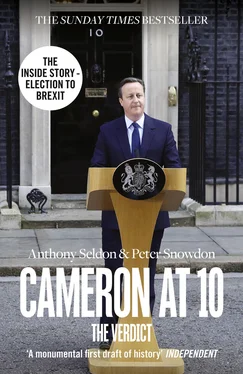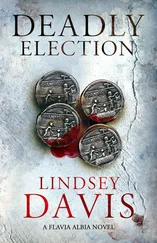Osborne leaves Hilton’s home in the afternoon of polling day to travel up to his Tatton constituency in Cheshire. Cameron, Andy Coulson and Llewellyn, joined by Kate Fall and Gabby Bertin, who had been a press aide since the leadership campaign, go for dinner at Cameron’s home in Dean, several miles away.6 They are under no illusions. As they gather around the television screen, the results are greeted with a deadpan silence. The exit poll at 10 p.m. confirms what was expected: a hung parliament with the Conservatives as the largest party. There will be no election miracle. The Conservatives emerge after the final count with 307 to Labour’s 258 and fifty-seven for the Lib Dems out of 650 parliamentary seats. The Conservatives may be the largest party, and gain the largest number of seats (net ninety-seven) in a general election since 1931, but it is little consolation. They are left nineteen seats short of an overall majority. Pressure mounts suddenly on Cameron. Critics in the party and the right-wing press, suppressed during the campaign, are now on the airwaves blaming him for a lacklustre campaign and for failing to engage core Tory voters. At 3.30 a.m. on Friday, a newly-energised Brown flies south from his Scottish constituency, believing he can cling to power. Cameron says Brown has lost the right to govern, but does not publicly call for his resignation. The prime minister, for whom Cameron’s aides have such strong reservations, is far from finished yet.7
Before he went to bed, Cameron had told his team to reconvene in the morning so they can explore options. They all know, none more than Cameron, that a minority government in hock to the Conservative right wing will be their idea of a total nightmare. Cameron has no love for them, nor they for him. ‘Let’s face it, coalition really suits him,’ says one close aide. ‘Is he really going to be happy with a minority government, with Eurosceptics like Mark Reckless and Bill Cash knocking on his door every ten minutes?’
At 2.34 p.m. on Friday, Cameron speaks at a press conference at St Stephen’s Club, Westminster, saying that the Conservatives will approach the days ahead with the ‘national interest’ in mind, and he will be making the ‘big, open and comprehensive offer’ to the Lib Dems to work with him in forming a government. ‘Cameron’s decision to call for a genuine coalition partnership is very significant,’ says master of ceremonies, O’Donnell. ‘This wasn’t going to be a short-term deal: there was going to be a real commitment that it would last for the life of the parliament. That’s what he wanted.’8 Cameron’s words are deliberately chosen, falling short of mentioning a coalition by name, leaving some room for manoeuvre, and offering some reassurance to the large numbers of Conservative MPs for whom the Lib Dems are anathema. Cameron’s team knows that he must carry the party, including his leadership rival in 2005, David Davis, the Eurosceptics, and others on the right of the party who dislike his politics.
Five days of intense negotiation with the Lib Dems follow in the secrecy of the historic Cabinet Office at 70 Whitehall.9 Cameron delegates the details of negotiations to a four-man team: Osborne, Letwin, Llewellyn and Hague, who acts as their head.10 The Lib Dems include David Laws, Danny Alexander, Chris Huhne and Andrew Stunell. As they meet, television screens in the background show riots in Greece. The eurozone crisis, brewing since mid-2009, broke out into the open in February 2010. It focuses their minds on the importance of achieving a stable government to take Britain forward.
Hague and Alexander banish O’Donnell’s posse of civil servants from minuting their discussions. Left alone, both sides find an affinity: ‘Talks with the Conservatives go far better than we imagined. There were no rows or unpleasantness. They are polite and civilised. It started the relationship below the Clegg–Cameron level,’ says Laws.11 Hague emerges from the talks pleased not to have conceded more to the Lib Dems: there is an agreement to introduce a fixed-term parliament (later enacted in 2011), reform constituency boundaries, hold a referendum on the Alternative Vote (AV), reform the House of Lords, introduce a ‘pupil premium’ in schools, and raise the income tax threshold. These are not considered big deals: the Conservative team believe they will easily win the AV referendum, and neither the pupil premium nor the rise in tax thresholds are out of tune with party thinking.12 The Lib Dems insist they would only agree to support the package if they can secure a fixed-term parliament, thus binding the Conservatives into a coalition for a full five years. Tory negotiators agree, believing it will contribute to stability. To O’Donnell, the deliberations ‘provided a chance for both parties to drop their rubbish policies. It was all pretty much as expected. Obviously they agreed to go further than Labour on the extent and speed of the deficit reduction.’ The pace of the negotiations would have consequences. Some policies, such as NHS reform, get through, which ‘none of them understood – frankly no one examined them carefully’.13 Ken Clarke, who encouraged Cameron to form a ‘proper coalition’ after the election, is surprised at how soon an agreement is reached. ‘It was precisely because no one had any experience of forming a coalition that they drew up an extremely good agreement in three days flat – no one on the Continent would have done that so quickly.’14
Letwin estimates that 80% of the policies hammered out in the ‘Coalition Agreement’ are straightforward because both parties have relatively similar proposals. The hardest concessions for the Lib Dems to swallow are retaining nuclear power stations and renewing the Trident missile system, which the Conservatives make clear are essential, but which the Lib Dems opposed in their manifesto. Both parties lose only some 10% of their favoured policies. The Conservatives lose out on inheritance tax, the West Lothian Question (namely the issue that since devolution in 1999, Scottish MPs could vote on English domestic matters) and the replacement of the Human Rights Act.15 Osborne is sanguine about losing inheritance tax. He knows it would be portrayed by Labour as a bung to the rich and has doubts about his ability to have got it through in his planned Emergency Budget.
Osborne thinks the discussions are not difficult because the areas of overlap are considerable. On the matter of Plan A however, the Conservatives are resolute: ‘The big judgement the Lib Dems had to make in policy terms was to back our fiscal judgement, which they had attacked during the election campaign,’ he says. ‘They consented because we insisted that it was non-negotiable.’16 Osborne believes that discussions the Lib Dem leadership held in private with O’Donnell, Nicholas Macpherson (the permanent secretary to the Treasury) and Mervyn King acted as a reality check, educating them in the need for urgent and tough action. He credits Vince Cable as a highly significant player recognising that Plan A was the right thing to do.17
Hague is struck by the naivety of the Lib Dem negotiating team, as by their lack of knowledge of nineteenth- and early twentieth-century coalitions. ‘Liberals always come out badly.’ Hague realises this, his Conservative colleagues know it, but the Lib Dem leadership he thinks does not. He is surprised too by their lack of familiarity with European coalitions, where the junior partner, whether in Ireland, Germany or elsewhere, is frequently annihilated at the next election. After the final meeting of the five days, Hague staggers home at 1 a.m. and tells his wife, Ffion, with prescience: ‘Well, we have formed a government … but we might well have destroyed the Liberal Party.’18
Without Clegg, the coalition would not have been formed. None of his predecessors as leader – Menzies Campbell, Charles Kennedy nor even Paddy Ashdown – would have countenanced a coalition with the Conservatives. Clegg insists too it will be a full coalition, not a ‘supply and confidence’ deal to enable a minority government to get through its Budgets and survive confidence votes, which would have been far more fragile. Clegg believes that the Lib Dems have the Conservatives on the run, and that unlike Labour’s team of Peter Mandelson, Ed Balls and Ed Miliband, the Tories are biddable: ‘Frankly, for Cameron and Osborne, the alternative to joining us was not pretty. They would have been out on their ears within two seconds at the hands of their own party.’19 So given this realisation, why does he not push harder?
Читать дальше












